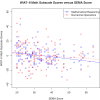Math anxiety in second and third graders and its relation to mathematics achievement
- PMID: 22701105
- PMCID: PMC3369194
- DOI: 10.3389/fpsyg.2012.00162
Math anxiety in second and third graders and its relation to mathematics achievement
Abstract
Although the detrimental effects of math anxiety in adults are well understood, few studies have examined how it affects younger children who are beginning to learn math in a formal academic setting. Here, we examine the relationship between math anxiety and math achievement in second and third graders. In response to the need for a grade-appropriate measure of assessing math anxiety in this group we first describe the development of Scale for Early Mathematics Anxiety (SEMA), a new measure for assessing math anxiety in second and third graders that is based on the Math Anxiety Rating Scale. We demonstrate the construct validity and reliability of the SEMA and use it to characterize the effect of math anxiety on standardized measures of math abilities, as assessed using the Mathematical Reasoning and Numerical Operations subtests of the Wechsler Individual Achievement Test (WIAT-II). Math achievement, as measured by the WIAT-II Math Composite score, was significantly and negatively correlated with SEMA but not with trait anxiety scores. Additional analyses showed that SEMA scores were strongly correlated with Mathematical Reasoning scores, which involves more complex verbal problem solving. SEMA scores were weakly correlated with Numerical Operations which assesses basic computation skills, suggesting that math anxiety has a pronounced effect on more demanding calculations. We also found that math anxiety has an equally detrimental impact on math achievement regardless of whether children have an anxiety related to numbers or to the situational and social experience of doing math. Critically, these effects were unrelated to trait anxiety, providing the first evidence that the specific effects of math anxiety can be detected in the earliest stages of formal math learning in school. Our findings provide new insights into the developmental origins of math anxiety, and further underscore the need to remediate math anxiety and its deleterious effects on math achievement in young children.
Keywords: early math learning; math anxiety; math anxiety assessment; mathematics achievement.
Figures



Similar articles
-
Mathematics achievement and anxiety and their relation to internalizing and externalizing behaviors.J Learn Disabil. 2014 Nov-Dec;47(6):503-14. doi: 10.1177/0022219412473154. Epub 2013 Jan 11. J Learn Disabil. 2014. PMID: 23313869 Free PMC article.
-
Assessing math anxiety in elementary schoolchildren through a Spanish version of the Scale for Early Mathematics Anxiety (SEMA).PLoS One. 2021 Aug 5;16(8):e0255777. doi: 10.1371/journal.pone.0255777. eCollection 2021. PLoS One. 2021. PMID: 34352004 Free PMC article.
-
Relationship between visual motor integration skill and academic performance in kindergarten through third grade.Optom Vis Sci. 1999 Mar;76(3):159-63. doi: 10.1097/00006324-199903000-00015. Optom Vis Sci. 1999. PMID: 10213445
-
Mathematics, anxiety, and the brain.Rev Neurosci. 2017 May 24;28(4):417-429. doi: 10.1515/revneuro-2016-0065. Rev Neurosci. 2017. PMID: 28157694 Review.
-
A Framework for Studying the Heterogeneity of Risk Factors in Math Anxiety.Front Behav Neurosci. 2018 Dec 3;12:291. doi: 10.3389/fnbeh.2018.00291. eCollection 2018. Front Behav Neurosci. 2018. PMID: 30559654 Free PMC article. Review.
Cited by
-
Cognitive and Affective Correlates of Chinese Children's Mathematical Word Problem Solving.Front Psychol. 2018 Dec 18;9:2357. doi: 10.3389/fpsyg.2018.02357. eCollection 2018. Front Psychol. 2018. PMID: 30618901 Free PMC article.
-
Positive Attitude Toward Math Supports Early Academic Success: Behavioral Evidence and Neurocognitive Mechanisms.Psychol Sci. 2018 Mar;29(3):390-402. doi: 10.1177/0956797617735528. Epub 2018 Jan 24. Psychol Sci. 2018. PMID: 29364780 Free PMC article.
-
Multidimensionality in the Measurement of Math-Specific Anxiety and its Relationship with Mathematical Performance.Learn Individ Differ. 2019 Feb;70:228-235. doi: 10.1016/j.lindif.2016.07.007. Epub 2016 Jul 19. Learn Individ Differ. 2019. PMID: 31011280 Free PMC article.
-
The Modified Abbreviated Math Anxiety Scale: A Valid and Reliable Instrument for Use with Children.Front Psychol. 2017 Jan 19;8:11. doi: 10.3389/fpsyg.2017.00011. eCollection 2017. Front Psychol. 2017. PMID: 28154542 Free PMC article.
-
Unraveling latent cognitive, metacognitive, strategic, and affective processes underlying children's problem-solving using Bayesian cognitive modeling.bioRxiv [Preprint]. 2025 Jan 31:2025.01.29.635409. doi: 10.1101/2025.01.29.635409. bioRxiv. 2025. PMID: 39975184 Free PMC article. Preprint.
References
-
- Achenbach T. M. (1991). Manual for the Child Behavior Checklist/4-18 and 1991 Profile. Burlington, VT: University of Vermont
-
- Ashcraft M. H. (2002). Math anxiety: personal, educational, and cognitive consequences. Curr. Dir. Psychol. Sci. 11, 181–18510.1111/1467-8721.00196 - DOI
-
- Ashcraft M. H., Faust M. W. (1994). Mathematics anxiety and mental arithmetic performance: an exploratory investigation. Cogn. Emot. 8, 97–12510.1080/02699939408408931 - DOI
Grants and funding
LinkOut - more resources
Full Text Sources

